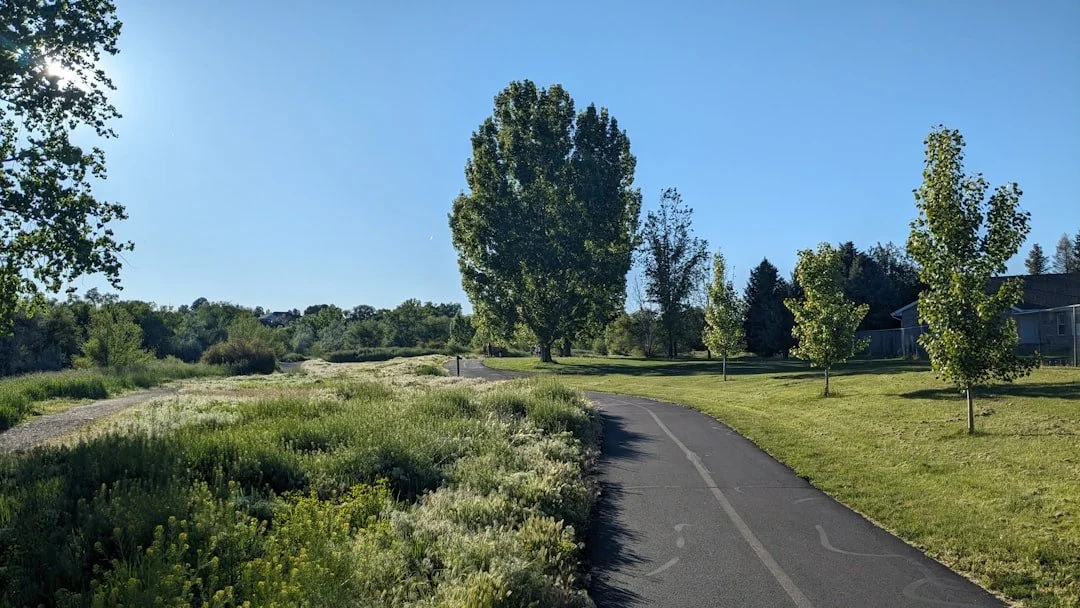The Best Hikes Without Even Leaving Denver
Your GPS says Red Rocks is 45 minutes away in Saturday traffic. Buffalo Creek? Hour and a half if you're lucky. But here's what most Denver fitness enthusiasts miss: you're surrounded by 850+ miles of urban trails that can kick your butt just as hard as any fourteener—and you can hit them on your lunch break.
I've worked with everyone from couch-to-5K beginners to ultra marathoners here in Denver, and I'll tell you what surprises them most: the secret isn't driving to the mountains every weekend. It's learning to use the elevation training goldmine that's literally outside your front door.
The Mile-High Training Advantage Nobody Talks About
Living at 5,280 feet means your body is already working 12% harder than sea level just walking to your mailbox. Add a 400-foot elevation gain on the Trading Post Trail, and you're getting altitude adaptation that coastal runners pay thousands to experience in training camps.
Research from the University of Colorado Sports Medicine Center shows that consistent elevation training at Denver's altitude increases red blood cell production by 15-20% within 3-4 weeks. That's free performance enhancement, delivered daily through your neighborhood trails.
Trading Post Trail at Red Rocks Park—world-class scenery, zero mountain driving
The 5 Urban Hikes That Build Real Mountain Fitness
1. Red Rocks Trading Post Trail (The Lunch Break Leg Burner)
Distance: 1.4 miles Elevation Gain: 364 feet Why it works: Those 364 feet hit different at 6,400 feet elevation. The trail's rocky terrain forces ankle stabilization work you can't get on a treadmill. Park at the Trading Post, knock it out in 45 minutes, and you've just completed the equivalent of a 500-foot climb at sea level. Beginner modification: Start with just the lower loop (0.7 miles) and add the upper section as you build strength. If you have knee pain, use trekking poles to distribute 30% of the load to your upper body. Pro move: Hit this trail 2x per week for three weeks before attempting your first fourteener of the season. Your lungs will thank you.
2. Green Mountain Trail (The Weekend Warrior Special)
Distance: 6.4 miles Elevation Gain: 1,089 feet Why it works: This is your fourteener prep without the 4am wake-up call. The sustained climb builds the exact quad endurance you need for descending steep mountain trails. Plus, the summit views rival anything you'll find in RMNP—with 90% less driving.
3. Cherry Creek Trail (The Recovery Day Secret Weapon)
Distance: 40 miles total (pick your segment) Elevation Gain: Minimal Why it works: Not every training day needs to destroy you. This paved trail system is perfect for Zone 2 cardio work—the foundation of endurance that most athletes skip. Pick any 5-mile segment for steady-state work that builds aerobic capacity without beating up your joints.
Cherry Creek Trail—your secret weapon for building aerobic base without joint stress
4. City Park Mile High Loop (The Precision Altitude Trainer)
Distance: 3.5 miles Elevation Gain: 78 feet Why it works: Markers show exactly where you're at 5,280 feet. Use this for tempo work—maintaining a challenging but sustainable pace at exact altitude. The loop configuration means no traffic lights, no excuses.
5. Washington Park Loops (The Social Hour Sweat Session)
Distance: 2.6 miles per loop Elevation Gain: Flat Why it works: Join the hundreds of Denver runners who make this their weekly ritual. The crushed gravel is easier on joints than pavement, and the two-lake configuration provides natural interval markers. This is where Denver's running community lives.
The Altitude Hack That Changes Everything
Here's what your Strava-obsessed friends don't understand: consistency beats intensity at altitude. A 2023 study from the American College of Sports Medicine found that athletes training 4-5 days per week at moderate intensity at Denver's elevation showed greater VO2 max improvements than those doing 2-3 high-intensity sessions.
Translation? Those daily Washington Park loops you squeeze in before work are actually doing more for your fitness than the weekend warrior who crushes themselves on a fourteener once a month.
Your Body at 5,280 Feet: The Science
At Denver's elevation, your body experiences:
Decreased oxygen saturation: 3-5% lower than sea level
Increased breathing rate: 20-25% higher during exercise
Elevated heart rate: 10-15 beats per minute higher for same effort
Enhanced mitochondrial density: 18% increase after 8 weeks of consistent training
This isn't a bug—it's a feature. Every urban trail run is secretly high-altitude training.
The Three-Week Urban Trail Challenge
Ready to prove these trails work? Here's your prescription (with beginner alternatives):
Week 1: Base Building
Monday: Cherry Creek Trail, 4 miles easy (Beginners: 2 miles)
Wednesday: Trading Post Trail, 1 loop (Beginners: lower loop only)
Friday: Washington Park, 2 loops moderate (Beginners: 1 loop)
Sunday: Green Mountain Trail, halfway up (Beginners: first mile only)
Week 2: Elevation Focus
Monday: City Park Mile High Loop, tempo pace (Beginners: comfortable pace)
Wednesday: Trading Post Trail, 2 loops (Beginners: 1 full loop)
Friday: Cherry Creek Trail, 6 miles steady (Beginners: 3 miles)
Sunday: Green Mountain Trail, full summit (Beginners: halfway)
Week 3: Integration
Monday: Washington Park, 3 loops with 5x1min surges (Beginners: 2 loops steady)
Wednesday: Trading Post Trail, fastest time attempt (Beginners: consistent pace)
Friday: Rest or easy Cherry Creek
Sunday: Your first fourteener (you're ready) (Beginners: Green Mountain summit)
Why drive to the mountains when this is your backyard?
The Recovery Protocol That Makes It Sustainable
Urban trails are convenient, but that convenience can lead to overtraining. After working with hundreds of Denver athletes, here's what actually prevents breakdown:
Hydration: 100+ oz daily (the dry air is real)
Electrolytes: Sodium/magnesium supplementation post-trail
Sleep: 8+ hours (altitude recovery demands it)
Strength work: 2x weekly focusing on single-leg stability
Foam rolling: Daily IT band and calf work
Winter considerations: December through March brings icy conditions. Invest in microspikes ($30-60) for traction, start later in the day when ice has melted, and check trail conditions at denvergov.org/parksandrecreation before heading out.
Skip these protocols, and those convenient trails become an injury highway.
When to Seek Professional Help
These trails are powerful training tools, but listen to your body. See a physical therapist if you experience:
Pain that persists for more than 3 days
Sharp or shooting pain during activity
Swelling that doesn't respond to rest and ice
Any pain that alters your gait pattern
Numbness or tingling in feet or legs
The Bottom Line
Stop treating Denver's urban trails like consolation prizes for when you can't get to the mountains. These trails deliver legitimate altitude training, build mountain-specific fitness, and fit into your actual life.
Thousands of Denver athletes have used these exact trails to prepare for fourteeners, qualify for Boston, and recover from injuries. The combination of accessibility, elevation, and variety makes them an unbeatable training resource.
Your world-class training ground is waiting. No traffic. No parking fees. No excuses.
Ready to maximize your urban trail training? Get Back Physical Therapy specializes in altitude-adapted training programs for Denver athletes. Our movement assessments identify your specific limiters and build personalized programs that turn city trails into performance gains. Schedule your trail-ready assessment today →
References
University of Colorado Sports Medicine Center. (2023). Physiological Adaptations to Altitude Training in Denver Athletes. UC Boulder Research Publications.
American College of Sports Medicine. (2023). Training Frequency vs. Intensity at Moderate Altitude: A Comparative Study. Medicine & Science in Sports & Exercise, 55(8), 1456-1467.
Denver Parks and Recreation. (2024). Urban Parks & Trails System Report. City and County of Denver.
International Mountain Bicycling Association. (2023). Trail Usage and Fitness Metrics: Denver Metropolitan Area. IMBA Research Division.
Journal of Applied Physiology. (2024). Mitochondrial Adaptations to Chronic Moderate Altitude Exposure. 136(2), 234-245.



